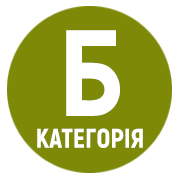The influence of Holstein breed inheritance on the development of linear traits cows firstborn of Ukrainian black-and-white dairy cattle
Abstract
The research was conducted to study the variability in the development of linear traits of the conformation type of firstborn cows of Ukrainian Black-and-White dairy breed depending on the influence of the conditional blood of Holstein breed. The experimental basis was the selection information on the linear classification of cows of the breeding farm PE "Buryn'ske" Pidlisnivsky branch of Sumy region. Assessment of cows by type was carried out within three groups of crossbred animals with conditional blood of Holstein breed: I - 62.5-74.9; II - 75.0-87.4 and 87.5% and above.
A significant effect of the conditional proportion of blood by the improving breed on the conformation type of animals had been established. With increase in the inheritance of Holstein breed in crossbred cows, the score for linear traits of the type increased. Animals of the III group were better than their peers from I and II groups, respectively, by group traits of dairy type by 2.9 and 0.8 score, body - by 2.9 and 1.3 score, limbs - by 0, 6 and 0.5 score and udder - by 2.8 and 0.6 score. The final grade increased from 81.3 score (cows of the first group with Holstein inheritance 62.5-74.9%) to 83.9 score (cows of group III with Holstein inheritance 87.5% and above).
Excess of high-blood hybrids in the III group compared with the I-st and II-nd by descriptive traits of conformation was revealed on body depth, angularity, rear width, front and rear udder parts attachment, central ligament, udder depth and teats length.
The research results suggested that increasing inheritance of Holstein breed significantly improved cow’s conformation type of Ukrainian Black-and-White dairy breed, which should be taken into account in the selection process of improving animals of this breed by conformation type.
References
2. Zubets', M. V., Burkat, V. P., Yefimenko, M. Ya. [et. al]. 1999. Burkat, V. P., ed. Henetyko-selektsiynyy monitorynh u molochnomu skotarstvi [Genetics and breeding monitoring in Dairy cattle]. K.: Ahrarna nauka, 88.
3. Klopenko, N. I. and Stavets'ka, R. V., 2015 Henetychna determinatsiia hospodarskoho vykorystannia koriv molochnoho napriamu produktyvnosti za vbyrnoho skhreshchuvannia. [Genetic determination of cow's economic use dairy direction of productivity by absorbing crossing]. Tekhnolohiia vyrobnytstva i pererobky produktsii tvarynnytstva: Zb. nauk. prats Bilotserk. nats. ahrar. un-ta. Bila Tserkva, issue 1, pp. 23–28.
4. Klopenko, N. I., 2012. Morfolohichni osoblyvosti vymia ukrainskoi chorno- riaboi molochnoi khudoby za vykorystannia holshtynskoi khudoby [Morphological features of udder Ukrainian Black-and-White dairy cattle using of Holstein cattle]. Suchasni problemy selektsii, rozvedennia ta hihiieny tvaryn : zb. nauk. prats Vinnytskoho NAU. Vinnytsia, issue 3(61), pp 83–88.
5. Ladyka, V. I., Khmel'nychyi, L. M., Burkat, V. P. and Ruban, S. Yu. 2010. Reyestratsiya ICAR. Dovidnyk [ICAR Registration: Reference book]. Sumy: Sumy National Agrarian University.
6. Merkur'eva, E. K., 1977. Geneticheskie osnovy selektsii v skotovodstve [Genetic bases of selection in livestock]. Moskva: Kolos, 240.
7. Pelekhatyy, M. S. and Kochuk-Yashchenko, O. A., 2014. Vplyv henotypu koriv-pervistok ukrainskoi chorno-riaboi molochnoi porody na yikh eksteriernyi typ, molochnu produktyvnist i vidtvornu zdatnist [Genotype influence of cows first-calf Ukrainian Black-and-White dairy breed on their conformation type, milk productivity and reproductive ability]. Nauk. visnyk LNUVMB im. S. Z. Hzhytskoho. Lviv, no. (3), pp. 143–158.
8. Pelekhatyy, M. S. and Piddubna, L. M., 2012. Kontseptsiia bazhanoho typu ta yii vykorystannia pry stvorenni vysokoproduktyvnoho zavodskoho stada molochnoi khudoby [Concept of the desired type and its use in creating a highly productive stud herd of dairy cattle]. Visnyk Zhytomyrskoho NAEU. Zhytomyr, no. (1), pp. 238–247.
9. Polupan, Yu. P., 2000. Povtoryaemost' i vzaimosvyaz' instrumental'noy i glazomernoy otsenki ekster'era krupnogo rogatogo skota [Repeatability and interrelation of instrumental and visual assessment of the cattle conformation]. Sel'skokhozyaystvennaya biologiya, no. 2, pp. 108-114.
10. Khmelnychyi, L.M., 2007. Bazhanyi eksteriernyi typ koriv molochnoi khudoby [Desired exterior type of dairy cattle]. Rozvedennia i henetyka tvaryn, issue 41, pp. 261–269.
11. Khmelnychyi, L. M., 2010. Bazhanyi typ yak kryterii doboru koriv molochnoi khudoby za eksterierom [Desired type as a criterion for selecting dairy cattle by conformation]. Visnyk Sumskoho NAU, issue 10(18), pp. 137–149.
12. Khmelnychyi, L. M., Ladyka, V. I., Polupan, Yu. P., Bratushka, R. V., Pryima, S. V. and Vechorka, V. V., 2016. Liniina klasyfikatsiia koriv molochnykh i molochno-miasnykh porid za typom [Linear classification of dairy and dairy-meat cows by type]. (Metodychni vkazivky) 2-e vyd., pererob. i dop. Sumy : Sumskyi Natsionalnyi Ahrarnyi Universytet, 27.
13. Khmelnychyi, L. M., 2007. Otsinka eksterieru tvaryn v systemi selektsii molochnoi khudoby: monohrafiia [Estimation of animal conformation in the breeding system of dairy cattle: monograph]. Sumy: “Mriya–1”, 260.
14. ICAR Guidelines for conformation recording of dairy cattle, beef cattle and dairy goats, 1/76. Section 5, Conformation gecording, version june, 2018. [Elektronniy resurs]. Rezhim dostupu: https://www.icar.org/Guidelines/05-Conformation-Recording.pdf

 ISSN
ISSN  ISSN
ISSN 



